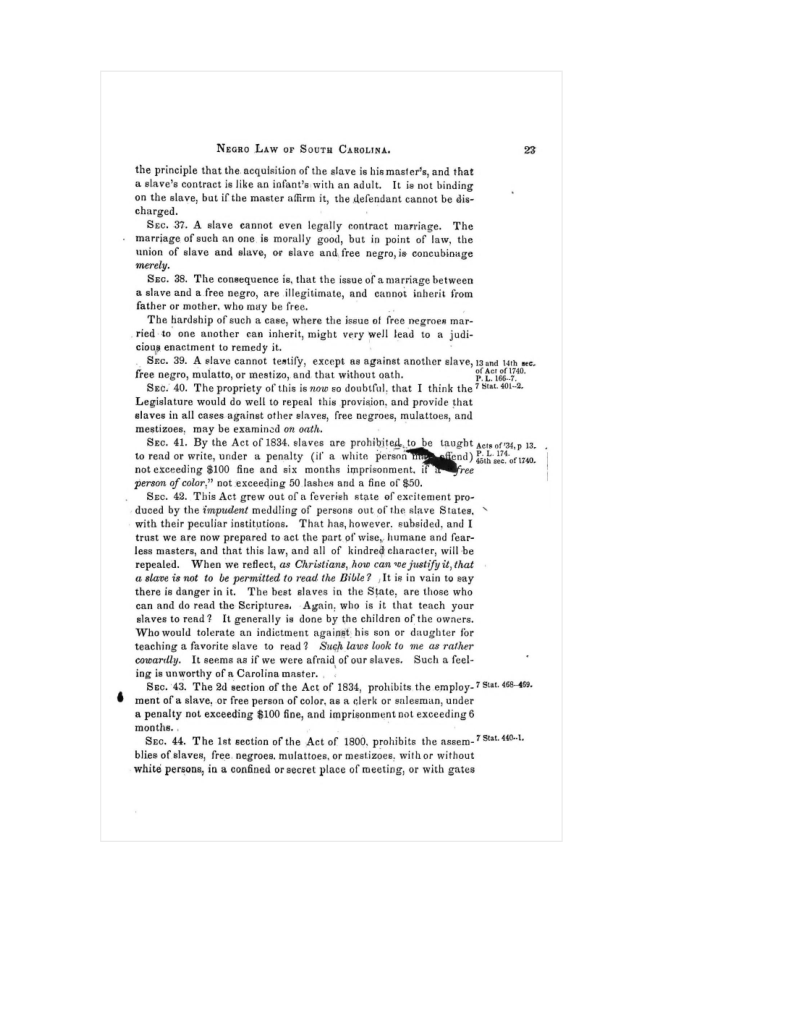South Carolina laws regulate the assembling of both enslaved and free African Americans.
- Type
- Book
- Source
- John Belton O'Neall Non-LDS
- Hearsay
- 2nd Hand
- Reference
John Belton O'Neall, The Negro Law of South Carolina (Columbia; John G. Bowman, 1848), 23-24
- Scribe/Publisher
- John G. Bowman
- People
- John Belton O'Neall
- Audience
- Reading Public
- Transcription
SEC. 44. The 1st section of the Act of 1800, prohibits the assemblies of slaves, free negroes. mulattoes, or mestizoes, with or without white persons, in a confined or secret place of meeting, or with gates of the or doors of such place of meeting barred or bolted, so as to prevent the free ingress and egress to and from the same; and Magistrates, Sheriffs, Militia Officers and Officers of the patrol, are authorized to enter, and if necessary, to break open doors, gates, or windows, (if resisted) and to disperse the slaves, free negroes, mulattoes or mestizoes, found there assembled. And the officers mentioned in the Act are authorized to call such force and assistance from the neighborhood, as they may deem necessary; and may, if they think necessary, impose corporal punishment on such slaves, free negroes, mulattoes, or mestizoes, and if within Charleston, they may deliver them to the Master of the Work House, who is required to receive them and inflict any such punishment as any two Magistrates of the City may award, not exceeding 20 lashes. If out of the City, the slaves, free negroes, mulattoes and mestizoes found assembled contrary to this Act, may be delivered to the nearest Constable, who is to convey them to the nearest Magistrate, and to inflict under his order, punishment not exceeding 20 lashes.
SEC. 45. The 2d section of the Act of 1800, which prohibited meetings for the religious or mental instruction of slaves, or free negroes, mulattoes or mestizoes, before the rising of the sun, or after the going down of the same, was very properly altered by the Act of 1803, so as to prohibit the breaking into any place of meeting, wherein the members of any religious society are assembled, before 9 o'clock at night, provided a majority are white people. After 9 o'clock at night, or before, if the meeting be composed of a majority of negroes, (although white persons may be present,) it may be dispersed by Magistrates, Sheriffs, Militia Officers, and Officers of the patrol, and slaves, free negroes, mulattoes and mestizoes may be punished not exceeding 20 lashes.
SEC. 46. In the case of Bell ads. Graham, it was held that these Acts could not justify a patrol in intruding on a religious meeting, in the day time, in an open meeting-house, where there were some white people, although there might be a majority of negroes.
SEC. 47. The 2d section of the Act of 1800, and the amendatory Act of 1803, are treated now, as dead letters. Religious meetings of negroes, with only one or more white persons, are permitted by night as well as by day. They ought to be repealed. They operate as a reproach upon us in the mouths of our enemies, in that we do not afford our slaves that free worship of God, which he demands for all his people. They, if ever resorted to, are not for doing good, but to gratify hatred, malice, cruelty or tyranny. This was not intended, and ought to have no countenance or support, in our Statute law.
The B. H. Roberts Foundation is not owned by, operated by, or affiliated with the Church of Jesus Christ of Latter-day Saints.

